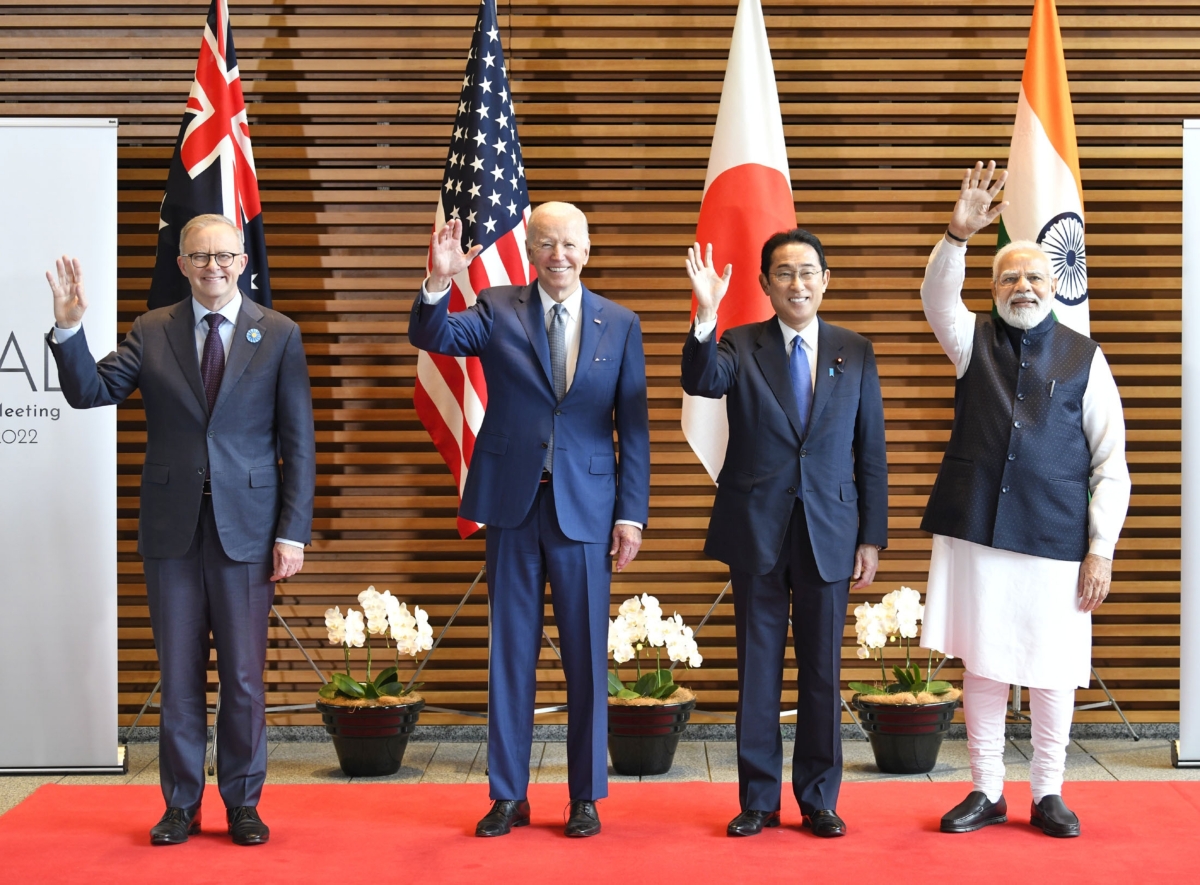Context-
In the dynamic landscape of the Indo-Pacific, strategic alliances and multilateral partnerships play a pivotal role in shaping regional dynamics and addressing emerging challenges. Among these partnerships, the Quadrilateral Security Dialogue, commonly known as the Quad, has emerged as a significant forum for cooperation among four major Indo-Pacific powers: the United States, Japan, India, and Australia. Since its revival in 2017, the Quad has garnered attention and speculation regarding its potential impact on regional stability and prosperity.
|
Quad
|
Current Commitment of the Quad
Signal of Commitment: After President Biden's absence at the Australian meeting, efforts pivoted towards a meeting in Hiroshima around the G7 gathering, indicating a persistent commitment to Quad objectives. The 2023 Leaders’ Summit resulted in a Joint Statement and a Quad Leaders' Vision Statement reaffirming a steadfast commitment to the Quad's agenda.
Key Announcements and Initiatives:The Quad has introduced several initiatives aimed at fostering cooperation and addressing regional challenges:
- Clean Energy Supply Chains: A Statement of Principles and an accompanying initiative to facilitate research and development in clean energy.
- Quad Health Security Partnership: Collaboration to enhance the region's capacity to detect and respond to disease outbreaks.
- Quad Infrastructure Fellowships Program: Empowering infrastructure practitioners in the region.
- Quad Partnership for Cable Connectivity and Resilience: Strengthening cable systems in the Indo-Pacific.
- Cooperation with Palau: Establishment of Open Radio Access Networks (Open RAN) to modernize telecommunications networks.
- Record of Cooperation: The Quad has seen increasing cooperation across various sectors including health, education, infrastructure, space, communications, and cyber. Regular meetings among top-level officials and military personnel signify a commitment to addressing global challenges and providing public goods.
- People-to-People Ties: Efforts to strengthen people-to-people ties within the Quad include the establishment of the Quad Fellowship, enabling doctoral and masters students from member countries to pursue degrees in leading American STEM universities.
- Subtle Impact and Alternative Standards: While the Quad's initiatives may not bring immediate transformative change, they contribute to building integration among member countries and provide alternatives to Chinese standards in critical areas such as technology, software, and cybersecurity.
- Growing Support and Constituency: The Quad's support base has expanded beyond security circles, indicating a sustained interest and commitment to its objectives. Continued engagement and cooperation suggest the Quad's resilience in the geopolitical landscape.
Challenges and Next Steps for the Quad
- Geopolitical Dynamics and Domestic Priorities: In the face of domestic political crises and distractions, such as the debt ceiling issue in the United States, maintaining focus on the Quad's objectives becomes challenging. Domestic priorities often overshadow international commitments, impacting the Quad's momentum.
- Role of India: India's level of commitment and stake in the success of the Quad remain pivotal. As a key player in the Indo-Pacific region, India's engagement will significantly influence the Quad's trajectory and effectiveness.
- Durable Support Base: Despite distractions and challenges, there exists a durable support base for the Quad among its member countries. Australia and Japan, in particular, demonstrate a consistent commitment to the Quad's goals, aligning with their broader foreign policy objectives.
- U.S. Focus and Attention: The United States' role and focus on the Quad may fluctuate due to domestic and international priorities, including ongoing conflicts in Europe and the Middle East. However, the Quad remains central to the U.S.'s Indo-Pacific strategy, albeit with varying degrees of attention.
- Next Steps for the Quad: Continued focus on delivering promises and building on areas of success is crucial for the Quad's long-term viability. Enhancing cooperation, addressing regional challenges, and strengthening ties among member countries will be paramount in solidifying the Quad's position as a significant actor in the Indo-Pacific.
- Imperative for an Open and Secure Indo-Pacific:The success of the Quad is integral to ensuring an open and secure Indo-Pacific region. By addressing key challenges and fostering collaboration, the Quad can contribute to regional stability and prosperity.
Conclusion
In conclusion, the Quad's trajectory in the Indo-Pacific region reflects a commitment to cooperation and addressing shared challenges. Despite disruptions and distractions, member countries remain steadfast in their support for the Quad's objectives. Moving forward, sustained focus on delivering on promises and navigating challenges will be essential for the Quad to realize its potential as a driver of stability and prosperity in the Indo-Pacific.
|
Probable Questions for UPSC Mains Exam- 1. Discuss the evolution of the Quadrilateral Security Dialogue (Quad) and its significance in shaping the Indo-Pacific region. How has the Quad's commitment been demonstrated through initiatives and partnerships? (10 Marks, 150 Words) 2. Analyze the challenges and next steps for the Quad in navigating the Indo-Pacific region, considering geopolitical dynamics, member countries' domestic priorities, and the imperative for regional stability and prosperity. (15 Marks, 250 Words) |
Source- VIF







